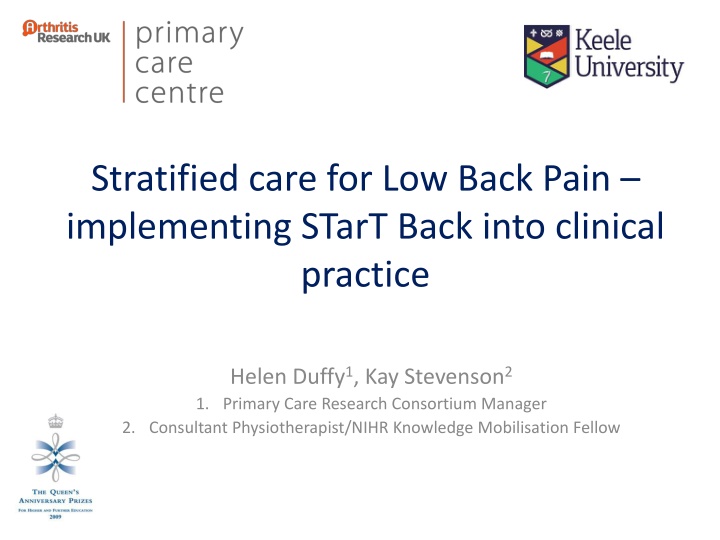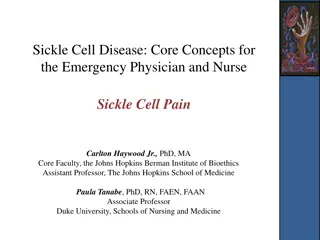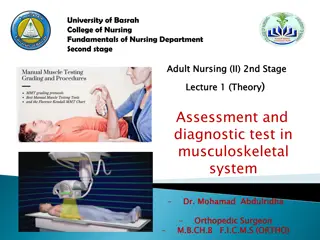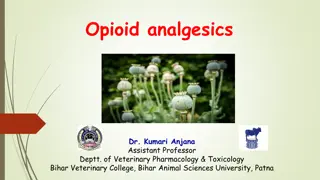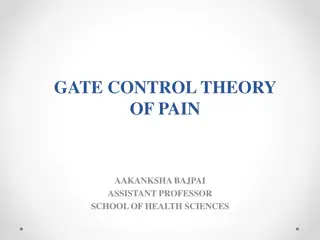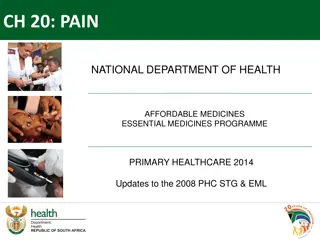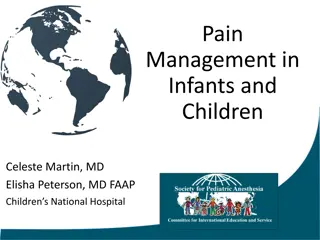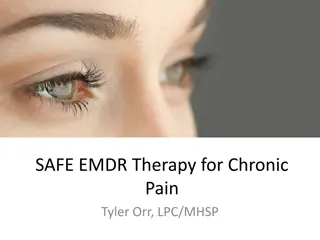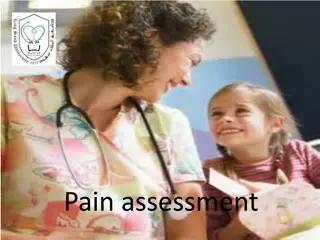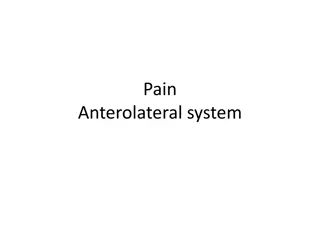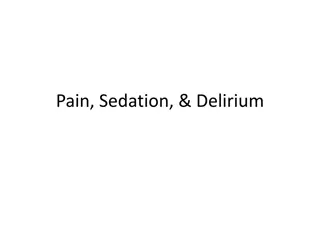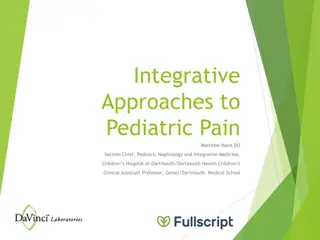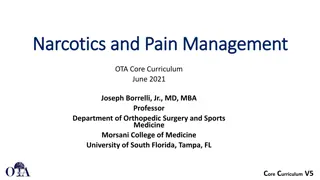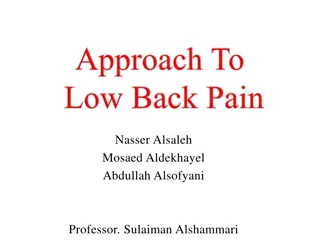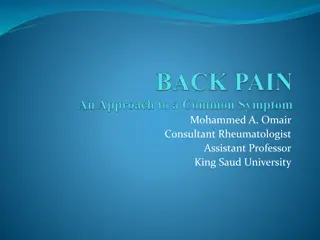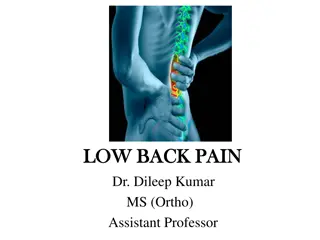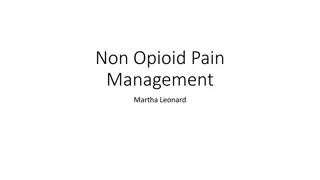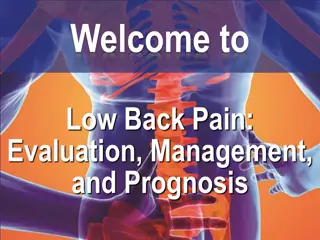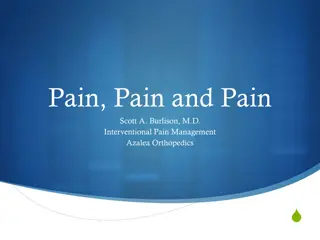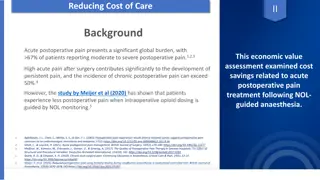Implementing STarT Back for Stratified Care in Low Back Pain Management
Helen Duffy and Kay Stevenson discuss the implementation of STarT Back, a screening tool designed to stratify low back pain patients for matched treatments based on modifiable risk factors. The tool is quick, validated, and helps clinicians identify high, medium, and low-risk patients for tailored physiotherapy interventions, treatment advice, and pain relief. The approach aims to improve clinical and cost-effectiveness in managing non-specific low back pain.
Download Presentation

Please find below an Image/Link to download the presentation.
The content on the website is provided AS IS for your information and personal use only. It may not be sold, licensed, or shared on other websites without obtaining consent from the author.If you encounter any issues during the download, it is possible that the publisher has removed the file from their server.
You are allowed to download the files provided on this website for personal or commercial use, subject to the condition that they are used lawfully. All files are the property of their respective owners.
The content on the website is provided AS IS for your information and personal use only. It may not be sold, licensed, or shared on other websites without obtaining consent from the author.
E N D
Presentation Transcript
Stratified care for Low Back Pain implementing STarT Back into clinical practice Helen Duffy1, Kay Stevenson2 1. Primary Care Research Consortium Manager 2. Consultant Physiotherapist/NIHR Knowledge Mobilisation Fellow
The STarT Back Story Back pain is common 85% will have non specific low back pain Factors such as fears, anxiety, mood motivation and work situation should be assessed (van Tulder et al, 2006) Large randomised trial that demonstrated that the use of a screening tool and matched treatment was clinically and cost effective for patients with back pain (Hill et al, 2011)
STarT Back screening tool Brief prognostic tool Takes 2 minutes to complete Designed to help clinicians produce an index of modifiable risk factors Used to stratify patients to matched treatments Tested for validity and reliability in different populations
STarT Back screening tool Thinking about the last 2 weeks tick your response to the following questions Disagree 0 Agree 1 My back pain has spread down my leg (s) at some time in the last 2 weeks 1 I have had pain in the shoulder or neck at some time in the last 2 weeks 2 I have only walked short distances because of my back pain In the last 2 weeks, I have dressed more slowly than usual because of back pain It s not really safe for a person with a condition like mine to be physically active Worrying thoughts have been going through my mind a lot of the time 3 4 5 6 7 I feel that my back pain is terrible and it s never going to get any better 8 In general I have not enjoyed all the things I used to enjoy 9. Overall, how bothersome has your back pain been in the last 2 weeks Not at all 0 Slightly 0 Moderately 0 Very much 1 Extremely 1
Stratified Care Model High Psychologically informed physiotherapy Medium risk Course of physiotherapy Minimal treatment advice, reassurance and pain relief Low risk Complexity
Hill et al, 2011 (n=851) 1. 2. 3. 4. Stratified care was cheaper, saving: an average 34 per individual (health costs) An average 675 per individual (societal costs) Improved clinical outcomes Improved patient satisfaction Much less time off work
Key results Change in physiotherapy referral patterns Low risk referral: 49% controls 7% targeted group Medium risk patients: 60% controls 98% targeted group High risk patients: 65% controls 100% targeted Cost Savings GP consultations Visits to NHS consultants Investigations MRI & x-rays Epidural injections Other private healthcare Medication Significant reduction in time off work Fewer referrals More referrals early More referrals early Whitehurst et al 2012 Ann Rheum Dis
Key messages High quality randomised controlled trial has demonstrated that using the STarT Back screening tool plus matched treatments tested in an implementation study (IMPaCT Back) Improves patient clinical outcomes Improves referral to physiotherapy Reduces healthcare and societal costs in research & implementation studies
But can these approaches be implemented in day-to-day practice?
Implementing STarT Back in day to day practice Local adoption (North Staffs pilot with SSOTP) Regional Cluster Pilots across West Midlands AHSN
Problems identified locally Patients expect active investigation/treatment GPs may be uncertain about: Best management Services available Physiotherapy access and waiting times Lack of feedback from Physio
Staffordshire and Stoke on Trent NHS Partnership Trust pilot implementation Locality GP cluster (Biddulph/Leek)- covers rural and market town population 615 referrals of low back pain in 12 months Patients referred through GP contact and Physio direct triage service GP & Physiotherapy clinical leads reviewed pathway, need to improve discharge communication RESULTS Oct 2013 Avoided over treating patients New to follow up ratios: Low Risk (24%) 1:1.3 Medium Risk (35%) 1:3 High Risk (41%) 1:4 Reduced waiting times Pre pilot = 52%; During pilot - 80% seen within target wait time Achieved 100% patient satisfaction Improved discharge letters back to GP (90% vs 26%) Reduced the number of patients being referred on for second opinion (1% to Impact service) Ensured patients receive appropriate treatment, delivered by highly trained physiotherapists
Stafford & Surrounds CCG Membership Board 5th March 2014 Innovation Group 3rd April 2014 Agreed to implement in practice Physiotherapy baseline audit, training in place for teams Total Numbers of Lower Back Pain Referrals (with and without STarT Back Screening Tool Attached) 160 Total Numbers of Lower Back Pain Referrals 140 120 100 95 80 140 71 No Tool Attached 60 Attached Start Back Tool 40 20 40 35 7 0 0 0 April 11% May June 27% July 36% Month of Year
Telford & Wrekin CCG Newport/Shifnall Community MSK Reduced follow up/not over treating Physiotherapy Waiting Time (weeks) 15 10 5 0 Jan. 2014 Aug-14
Next steps: Collaborative project led by Keele University within the Integrated Care/Long Term Conditions Theme, West Midlands Academic Health Science Network - Supporting uptake in general practice: innovation = the development of a computer platform to generate referrals to physiotherapy utilising evidence based tool EMIS/SystmOne STarT Back tool fires with appropriate read code and once completed offers: Low risk = high quality patient information patient.co.uk; Medium/High Risk = pre populated referral form to physiotherapy for automated submission to physio services - - quality indicator = using a screening tool and matched treatments, for patient with low back pain, improves clinical outcomes and reduces cost provision of high quality patient information (PPI group/patient.co.uk) - - - Supporting clinical pathway development training in physiotherapy treatments (43 trained within WM AHSN) facilitation events audit tools
Referral to Physiotherapy generated automatically Appropriate Physiotherapy treatment GP Consultation Good quality patient information (patient.co.uk) Training for physios provided System developed with GPs
What we aim to achieve Assist GP referral by using: Integrated referral template within EMIS/SystmOne Better use of physiotherapy services: Early targeted referral Shorter waiting times Improved feedback to GP on outcome Improved patient information Fewer repeat consultations for GPs
Integrated Care Theme West Midlands Academic Health Science Network Pilot clusters across WM AHSN stratified care for low back pain Project Management Support Identify GP locality & referring sites Install screening tool offer GP training Competency/Training for Physiotherapy matched treatment options Working with EMIS & System One to embed tool High quality patient information user group, patient.co.uk Promotional DVDs Website Pilot with North Staffs CCG integrated IT platform
National Tools Department of Health AHP QiPP Guidelines Any Qualified Provider documentation MSK commissioning online toolkit App /AXA DVD Pain Management Guidelines Map of Medicine (RCGP/British Pain Society) Tool added into National Spine Registry British Association of Spinal Surgeons Arthritis Research UK/BMJ e-learning modules; GP Update Course (NB Medical) STarT Back website www.keele.ac.uk/sbst/
Acknowledgements The STarT Back & IMPaCT Back study teams GP practices and physiotherapy services Study participants Full information on website www.keele.ac.uk/startback With 20 min DVDs explaining the approach
